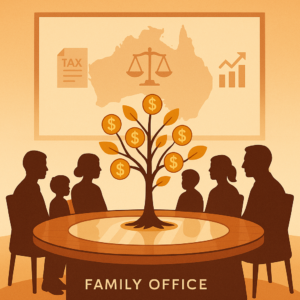Australia has seen a significant increase in family offices as wealthy families seek sophisticated ways to manage their assets, investments, and legacies.
The concept has evolved from simple wealth management to comprehensive structures handling everything from investments to succession planning.
As of early 2025, Australia is home to more than 2,000 family offices managing assets ranging from AUD 20 million to over AUD 2 billion.
According to Capital Brief, most of these offices are known for overseeing between AUD 250 million and AUD 500 million.
If you are looking to invest as an expat or high-net-worth individual, which is what I specialize in, you can email me (hello@adamfayed.com) or WhatsApp (+44-7393-450-837).
This includes if you are looking for a second opinion or alternative investments.
Some facts might change from the time of writing. Nothing written here is financial, legal, tax, or any kind of individual advice or a solicitation to invest.
This post explores setting up a family office in Australia, covering key considerations from initial capital requirements to practical implementation steps.

Setting Up a Family Office in Australia: The Importance
Starting a family office in Australia requires careful planning across legal, financial, and operational dimensions.
This has to be done while ensuring compliance with regulatory requirements and alignment with long-term family objectives.
Essential early steps include defining clear objectives and selecting an appropriate legal entity, typically a proprietary limited company or a corporate trustee structure.
This can be for wealth preservation, intergenerational succession, philanthropic coordination, or a combination thereof.
You’ll need to secure an Australian Business Number (ABN) and Tax File Number (TFN), and determine if you require an Australian Financial Services (AFS) license.
This is because most family offices providing bespoke financial product advice or investment services must be authorized under an AFS license.
What Is a Family Office in Australia?
A family office in Australia is an entity dedicated to managing the wealth, investments, and personal affairs of a high-net-worth family.
Unlike traditional wealth management services, family offices provide comprehensive, tailored solutions.
Family offices in Australia have developed into a thriving ecosystem rivaling those in other major economies.
They operate primarily to centralize wealth management, optimize tax positions, facilitate succession planning, and coordinate philanthropic endeavors.
These organizations provide families with privacy, control, and customized approaches to preserving and growing their wealth across generations.

There are three main types of family offices:
- Single Family Offices (SFOs): Serving only one family, providing highly personalized services tailored to that family’s specific needs
- Multi-Family Offices (MFOs): Serving multiple families, offering economies of scale but with somewhat less customization
- Embedded Family Offices (EFOS): These are informal structures within a family-owned business, leveraging existing staff for financial support.
Note that EFOs may lack the specialized expertise of dedicated family offices and can be less efficient than SFOs or MFOs. So, we’ll primarily be focusing on SFOs and MFOs.
Services typically comprise:
- Investment management
- Tax and estate planning
- Philanthropic coordination
- Family governance
- High-touch concierge offerings such as education planning or household administration.
Regulatory Supervision
In Australia, family offices operate under the supervision of:
- The Australian Securities and Investments Commission (ASIC) for licensing
- The Australian Taxation Office (ATO) for tax and trust administration

How Many Family Offices Are There in Australia?
As per estimates, there are over 2,000 family offices in Australia as of 2025, a 150% increase over the past decade.
The aggregate wealth managed by the top 350 offices ranges between AUD 515 billion and AUD 695 billion.
Major financial hubs include:
- Sydney and Melbourne: Each hosts around 20 of the top 50 family offices.
- Perth: Buoyed by mining wealth, it is a growing centre for family offices.
- International Expansion: Many offices establish satellite operations in New York or London to diversify global investments.
Sources of family wealth are diverse, spanning real estate and retail dynasties, as well as technology and resources.
An interesting trend is that many Australian family offices have established overseas operations.
This international expansion reflects the global outlook and diversification strategies of Australian family offices.
Can I Create My Own Family Office?
Yes, setting up your own family office in Australia is entirely feasible with the right strategy.
How to Set Up a Family Office in Australia: Key Steps
The process involves several steps:
1. Define Objectives
Clarify goals such as wealth preservation, growth, tax efficiency, succession, and philanthropy.
2. Select Legal Structure
Most choose a proprietary limited company or corporate trustee; involve specialist legal advisers to draft constitutions or trust deeds.
3. Assemble Your Team
Key roles include a Chief Investment Officer, financial controller/accountant, legal counsel, and administrative staff.
4. Obtain Regulatory Approvals
Register with ASIC, apply for an AFS licence if offering financial services, and secure ABN/TFN.
5. Implement Governance
Establish policies for investment decisions, conflict resolution, and succession planning; the ATO advises documenting and reviewing a succession plan regularly to manage potential tax impacts.
6. Deploy Operational Systems
Adopt technology platforms for portfolio tracking, reporting, and secure family communication.
7. Draft an Investment Policy Statement
Define asset allocation, risk parameters, and performance benchmarks consistent with family values.
It’s worth noting that the ATO has increased its focus on family offices, particularly regarding succession strategies and tax compliance.
Working with advisors who understand these regulatory considerations is crucial to establishing a compliant family office structure.

How Much Money Do You Need to Start a Family Office?
The capital required to establish a viable family office in Australia varies significantly depending on the scope and scale of operations.
According to industry analysis, family offices in Australia manage capital ranging from approximately $20 million to more than $2 billion. The majority of these range between $250 million and $500 million.
Industry experts generally consider $100 million in investable assets as the threshold where a dedicated family office becomes economically viable.
However, there is no strict minimum.
Below $100 million, the fixed costs of running a full-service family office may outweigh the benefits.
These costs typically include:
- Professional staff (investment managers, accountants, legal advisors)
- Office space and infrastructure
- Technology systems for investment tracking and reporting
- Compliance and regulatory expenses
- Third-party service providers and consultants
For families with substantial wealth but below the typical threshold, alternatives include:
- Joining a multi-family office to share operational costs
- Using “virtual” family office services
- Implementing a hybrid model (EFO) with some in-house functions and others outsourced
The appropriate structure depends on the family’s specific circumstances, including the complexity of their assets, geographic distribution, and long-term objectives.
Is Family Office Worth It in Australia?
Australia’s wealthy families navigate the considerable intergenerational wealth transfer expected in the coming decades.
Properly structured family offices will play an increasingly important role in preserving legacies, optimizing tax positions, and ensuring smooth succession planning.
In this way, families can establish effective family office structures that serve their needs for generations to come.
Whether you opt for a single-family office managing hundreds of millions in assets or begin with a more modest structure incorporating family trusts and selective outsourcing, the key is aligning the approach with your family’s specific needs, values, and long-term objectives.
Understand the fundamentals outlined in this guide and work with qualified advisors familiar with Australia’s regulatory environment.
Pained by financial indecision?

Adam is an internationally recognised author on financial matters with over 830million answer views on Quora, a widely sold book on Amazon, and a contributor on Forbes.



